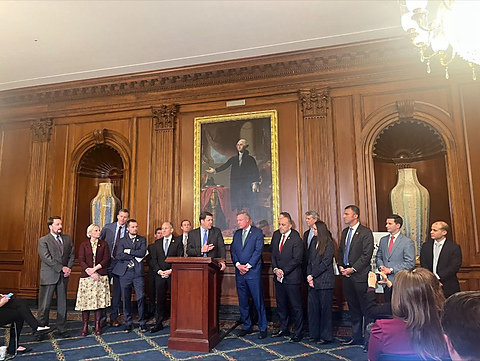Romina Boccia
It was a big week for advancing fiscal restraint in Congress. The House Budget Committee passed the Fiscal Commission Act of 2024 out of committee on January 18 with bipartisan support. This is a positive step toward bringing more attention to the nation’s rapidly deteriorating fiscal state and advancing proposals to address it.
The version of the bill that passed was introduced as a substitute, meaning committee members voted on a version that’s slightly different from the original Fiscal Commission Act of 2023, introduced last September.
The biggest differences include:
emphasizing the need for public education on the nature and scope of America’s fiscal crisis;
extending the deadline for stabilizing the US public debt at no more than 100 percent of GDP to 15 years, instead of 10;
reducing the number of commissioners, from each political party, that must be part of a simple majority to advance the group’s proposal from three members to two; and,
allowing a simple majority of the commissioners to vote on extending the reporting deadline from December 12, 2024, to May 15, 2025, thus pushing the commission’s proposal out of the lame‐duck Congress.
In a promising sign of coordination between the two chambers, the extended deadline aligns the House version of the Fiscal Commission Act more closely with its Senate companion, introduced as the Fiscal Stability Act. The new version also emphasizes that any changes to programs governed by trust funds (Social Security, Medicare, and Highway) shall improve those funds’ solvency for at least seventy‐five years. This may mean that Congress is moving closer to a bipartisan compromise in adopting the Fiscal Commission Act as part of government spending negotiations this spring.
Below is how the Fiscal Commission Act compares to a BRAC‐like fiscal commission. You can also download this one‐pager as PDF here.
Fact Sheet: A Fiscal Commission to Stabilize the Debt
The US debt is too high and growing too rapidly. An effective fiscal commission can support Congress in stabilizing the debt and avoiding a future fiscal crisis. The most promising approach would be modeled after the successful Base Realignment and Closure process. A BRAC‐like fiscal commission would be independent, involve the president, and its recommendations would be expedited in Congress through silent approval. While it shares certain features with the Fiscal Commission Act of 2024, there are notable differences that legislators should consider closely.
Key Features of a BRAC‐Like Fiscal Commission
Clear Objectives: The commission is tasked with generating policy proposals that would stabilize the debt at 100 percent of GDP within 10–15 years. Changes to programs governed by trust funds should improve 75‐year solvency.
Independent Experts: All commissioners are independent experts nominated by Congress and/or the president, and confirmed by the Senate.
Public Accountability: In a departure from the original BRAC commission, the commission would publish meeting agendas and minutes, provide public access to documents and data used in its work, and hold public hearings and community forums for public input. The commission would publish periodic reports on its findings and deliberations. Such transparency is important due to the wide‐ranging reforms being considered.
Certified Results: Oversight agencies, such as the Congressional Budget Office, the Government Accountability Office, and the Social Security and Medicare Trustees certify that a reform package achieves debt stabilization and that any changes to trust fund programs improve 75‐year solvency.
Fast‐Tracked Authority: The president reviews the commission’s recommendations. If approved, they are sent to Congress as a comprehensive package. If rejected, the president provides detailed objections, allowing the commission to revise its recommendations.
Silent Approval: Upon presidential approval, the commission’s recommendations become self‐executing after forty‐five days. Congress has the option to pass a joint resolution rejecting the reform package using expedited procedures.
Key Differences: BRAC‐like Fiscal Commission vs. Fiscal Commission Act of 2024
Commissioners: The Fiscal Commission Act relies primarily on legislators as commissioners, including experts only in a non‐voting, advisory capacity. A BRAC‐like commission is either composed entirely or primarily of independent experts, enabling a more objective assessment of policy solutions.
Approval: The BRAC‐like commission uses silent approval, avoiding the need for an affirmative vote in Congress. The Fiscal Commission Act requires members to vote on the commission proposal before it can go into effect. While expedited procedures will help, such a vote will be politically risky and could undermine the commission’s success.
Recommended Resources
Not Just Any Fiscal Commission Will Resolve America’s Fiscal Crisis
A Fail‐Safe Congressional Fiscal Commission to Fix Government Spending and Debt
With $34 Trillion in Debt, House Budget Committee Debates the Fiscal Commission Act

